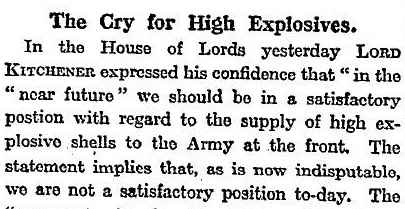It’s been an interesting couple of months a hundred years ago. There have been the landings at Gallipoli, the German use of gas at Ypres, the imminent departure of both the First Lord of the Admiralty and the First Sea Lord, the failure of the British attack at Aubers Ridge and the “Shell Scandal” – the claim that the Aubers failure was due to a lack of shells. Meanwhile, the Lusitania has been torpedoed, Zeppelin raids are continuing and the Bryce Report into alleged German atrocities in Belgium has concluded that most of the allegations are true. In shades of the London riots of 2011 – demonstrators have asserted their right to protest at the uncivilised behaviour of the German government and – additionally and in consequence – to steal and break the property of all those who have German names.
There are a couple of ideas going on here.
The first idea is that we – the British – are dealing with a ruthless and unprincipled enemy and that therefore we must at least be equally ruthless and possibly equally unprincipled. The second idea is that it is the state’s responsibility and privilege to lead and enforce British ruthlessness. There must be no more amateurism or muddling through. Everything must be systematic and uniform and directed from the top. Early signs of this change in approach will be the formation of a coalition government and the foundation of the Ministry of Munitions. Already there have been calls for conscription which is odd given that the New Armies raised in 1914 have yet to fight.
I suspect that, like most things that government does it didn’t work, or at least, worked no better than if they had left things to market or – given the central role of government in any war – near-market forces. However, he who wins gets to write the myths. And so the myth that government direction works got established in the UK. Probably.





Yes even why they were fighting Prussia-Germany the Western powers (leaders and mobs) were in the chains of Prussian-German ideas.
It goes back a long before the First World War, to Bismark and a century before that to the Cult of Frederick the Great.
Supposedly Frederick the Great had “proved” that a Progressive and honest state (manned by the public spirited) could achieve X, Y, Z, both in war and at home.
It was nonsense – Frederick’s domestic policies were a failure (for example his law code was a mess).
Even militarily he was eventually defeated – but the Empress Elizabeth died before her Cossacks could ride into Berlin and end “the Great” once and for all.
Sadly the heir to the throne of Russia was a member of the Cult of Frederick.
And that is the point – the facts do not matter, only the Cult (the “intellectual fashion”) matters.
In the First World War German economic management was a mess.
The less statist approach of France was less bad.
This was pointed out by Ludwig Von Mises in “Man, Economy and State”.
But it does not matter.
As even the French believed that the statist approach of the Germans (“War Socialism”) MUST be better.
It is not just the Cult of Frederick the Great – it is also the “Spell of Plato”.
Although Aristotle also sneers and business people (traders and manufacturers) and places the Law Giver in a position to control society.
How does one counter all this?
I do not know.
I just do not know.
Just a thought: could we persuade (be it feasible) Google to set up an electronic simulacrum of the Sage of Kettering to post here for a while as (i) an updating of the Turing test and (ii) a chance to let him take a holiday?
To counter this? Tell the truth, all of it, even though the Sky may fall. There was never a man so hated, as he who told the truth.
Raw central direction can work well – for short periods, for very well defined ends, such as fighting a war. “War is the health of the state”, and successful war feeds the delusion of statists that the state is omnicompetent.
The centrally directed Soviet state successfully put forth an enormous war effort during WW II.
Ironically, though, the WW II U.S. put forth an even larger war effort with distributed organization. The war production office compiled and distributed a directory of every manufacturing operation in the U.S., coded by what each factory could do in generalized terms. Then they let private businesses bid for war work and find their own subcontractors.
During WW I, the U.S. had adopted the centrally planned model, and the result was FUBAR.
And please note, after every war, the center keeps growing. Here in Australia, Canberra expanded its’ powers at the expense of the States during WW2, and it has never trimmed them since. If politicians, like Bob Hawke, talk about reforming the system, they never mean less power to Canberra! Usually their utopias have no states, but keep the local councils and shires as mendicants.